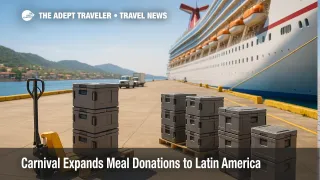Carnival expands meal donations to Latin America

Carnival Corporation & plc will expand its fresh meal donation program to Latin America, signing formal agreements with partners in Mexico, Honduras, and the Dominican Republic. The effort redirects safe, prepared, and unserved meals from ships to local food banks and community groups. Backed by the company's Less Left Over strategy to cut food waste, the initiative now spans 19 destinations worldwide and builds on a program launched in 2017. Carnival says the move helps support families facing food insecurity in port communities while reducing waste across its fleet.
Key points
- Why it matters: Cruise surplus meals will now support communities at three new Latin American ports.
- Travel impact: No service changes; the program strengthens ties with ports that host cruise calls.
- What's next: Expansion to additional destinations under local food safety and donation rules.
- Program partners are affiliated with the Global FoodBanking Network.
- The program has delivered more than 300,000 unserved meals to date.
Snapshot
Carnival Corporation signed memoranda of understanding to bring its fresh meal donation program to Latin America for the first time. New agreements in Mexico, Honduras, and the Dominican Republic establish processes to donate safe, ready-to-eat, unserved meals from ships to vetted local partners for distribution. The partners participate in the Global FoodBanking Network, providing logistics and compliance support. With these additions, the program will operate in 19 destinations worldwide. Carnival frames the expansion as both a community benefit and a food-waste reduction win, aligning with its fleetwide Less Left Over initiative. The company highlights a focus on schools, hospitals, and community organizations in each port.
Background
Carnival's surplus meal donation effort began in 2017 through Costa Cruises in partnership with Fondazione Banco Alimentare, a first for global shipping at the time. Since launch, the program has delivered more than 300,000 prepared, unserved meals to partners in Spain, Italy, France, Martinique, and Guadeloupe. The company's Less Left Over strategy prioritizes menu planning, onboard production efficiencies, and responsible redirection of surplus food where laws and health codes permit. As cruise lines call at dozens of ports with differing regulations, scaling food donation requires local agreements that specify food handling, transport, and distribution standards. The new Latin America MOUs formalize those processes in three additional countries.
Latest developments
Meal donation pilot launches in Mexico, starting in Ensenada
Carnival signed an agreement with Bancos de Alimentos de México (Red BAMX). The collaboration will begin with a pilot in Ensenada, then expand to other locations where Carnival Cruise Line ships call and Red BAMX operates food banks. The framework covers how safe, ready-to-eat, unserved meals are transferred dockside to food bank partners, then routed to families and community organizations. Red BAMX's nationwide network provides scale and compliance expertise, which should speed replication at additional Mexican ports once the pilot proves out. The arrangement complements Mexico's growing food bank infrastructure and could reduce organic waste from ship galleys in high-call ports.
Roatán partnership targets schools and hospitals in Honduras
In Honduras, Carnival signed an agreement with the mayor of Roatán to donate unserved meals and surplus ingredients from Carnival Cruise Line vessels calling at the island. The plan focuses on schools, hospitals, and community organizations, using municipal coordination to manage distribution and storage. Given Roatán's steady cruise schedule, a predictable cadence of donations could emerge, aligning ship arrivals with local needs. The city partnership model may also offer a template for other Honduran ports that host cruise calls, provided food safety and cold-chain requirements are met consistently.
Puerto Plata collaboration aligns church and food bank networks
For the Dominican Republic, Carnival signed agreements with the Catholic Diocese of Puerto Plata and Banco de Alimentos República Dominicana. The dual-partner approach pairs the diocese's community reach with the food bank's technical expertise in receiving, storing, and routing meals. Priority recipients include schools, hospitals, and community organizations in Puerto Plata. With both networks already embedded locally, the program can integrate quickly into existing charitable distribution, helping ensure donated meals reach households experiencing food insecurity, while limiting waste from shipboard dining operations.
Analysis
For travelers, the initiative will be largely invisible onboard, but its long-term benefits matter to destinations that anchor cruise itineraries. Cruise ships manage complex food operations, and even with careful planning there is unavoidable surplus. Formalized donation frameworks turn a disposal problem into community value, provided donations meet strict safety standards and local laws. Latin America presents both opportunity and complexity: ports with high call volumes can support regular donations, yet regulatory and infrastructural differences require tailored MOUs, vetted partners, and reliable cold-chain logistics. The Global FoodBanking Network affiliation helps standardize best practices across countries. Strategically, the program strengthens port relationships and advances corporate sustainability goals without changing the guest experience. If the Ensenada pilot scales and Roatán and Puerto Plata maintain predictable intake, Carnival can expand to additional ports, amplifying impact while further reducing organic waste across its fleet.
Final thoughts
Carnival's expansion signals a maturing approach to surplus food management at scale, marrying waste reduction with community benefit in key cruise markets. By anchoring the model in trusted food banks and local institutions, the company reduces friction, improves safety compliance, and increases the likelihood of steady distribution to families in need. As more ports come online under consistent standards, the effort should help cut waste while deepening ties with destinations that welcome cruise guests. For travelers choosing brands with visible community impact, this is a meaningful step forward for the Carnival meal donation program.
